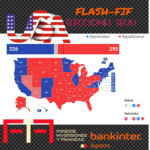 Mientras la Bolsa Española parece comenzar la semana con un claro retroceso en el IBEX 35, situando la rentabilidad acumulada en el año 2018 cerca de un -3%, diversas noticias políticas nacionales parecen haber introducido nuevas incertidumbres. La moción de censura para el Gobierno, junto al tema catalán, siguen dominando los titulares, a los que se unen nuevos problemas para Italia en la formación de un nuevo Gobierno.
Mientras la Bolsa Española parece comenzar la semana con un claro retroceso en el IBEX 35, situando la rentabilidad acumulada en el año 2018 cerca de un -3%, diversas noticias políticas nacionales parecen haber introducido nuevas incertidumbres. La moción de censura para el Gobierno, junto al tema catalán, siguen dominando los titulares, a los que se unen nuevos problemas para Italia en la formación de un nuevo Gobierno.Donald Trump’s protectionist rhetoric on the US current account deficit had increased concerns over a possible trade war that was likely to jeopardise global growth. But the US and China have now agreed to remove trade barriers and help US companies gain access to China, a development that could impact other countries which also export to China.
Optimism over the agreement was short-lived as Donald Trump, ahead of the November 6 midterms, appeared to heed representatives from both sides of Congress who fear that the issue of protecting intellectual property in China might be sacrificed to short-term trade balance questions. Europe appears to be the area with the most to lose from the US-China agreement as it is unlikely that China’s trade imbalance with the US will be solved simply by upping imports of US soya. We should therefore expect big deals in the aerospace sector, a field which is currently the preserve of China’s state-held companies. On Thursday, the US President threatened to impose additional levies on imported cars, a statement that hit European auto makers’ shares hard. And then he once again changed his mind and cancelled the US-North Korea summit.
Europe’s first PMI indicators for May revived worries over the pace of growth in the eurozone. Manufacturing and services composite indices in France, Germany and the eurozone cast doubts on growth remaining as strong. Demand, including new export orders, continued to slow. However, the reading remained over 50 and so in expansionary territory, which suggests growth will remain close to, if lower than, current levels. At least employment remained upbeat, a token of the labour market’s momentum.
Meanwhile, Giuseppe Conte was appointed as Italy’s new Prime Minister. He will play a central role in providing more visibility on future Italian policies and easing relations with European bodies. The coalition’s programme promises a number of conflicts to come, notably over austerity and migration. Markets are focusing on the country’s debt. Yields on 10-year Italian government bonds jumped to over 2.4%. But non-domestic investors only have limited exposure to Italy’s €2.7 trillion bond market which is two-thirds held by Italian residents, i.e. banks, pension funds and insurance companies. They tend to be less sensitive to price variations and the ECB itself hold 15% of outstanding government debt.
Amid today’s strained geopolitical situation and a temporary slowdown in advanced PMI indicators, we still have faith in the strength of the ongoing cycle. US dollar appreciation against all currencies has been the primary driving force behind recent market moves, allowing Europe to rebound in spite of slowing macroeconomic data. As a result, we have tactically reduced overall equity exposure, especially in Europe and Japan. We believe the growth/inflation mix will remain crucial and currently the situation still favours Europe at the expense of the US.
|
|
European equities |
Equity markets lost ground on political tensions in Italy, eurozone PMI data which confirmed a slowdown in growth and persistent friction between the US and China. The US dollar advanced further against the euro and Italian spreads widened again ahead of news of key appointments in Giuseppe Conte’s new government. The most cyclical sectors were hit by a rise in risk aversion and defensives logically found favour. Oil stocks slipped as the oil price fell back. Banks continued to suffer from persistently low long-bond yields as well as from the Italian situation. Autos, particularly in Germany, were hit by Donald Trump’s threat to raise import tariffs. French telecoms stocks outperformed on hopes for sector consolidation after a more conciliatory statement from the country’s regulatory body ARCEP.
Deutsche Bank tumbled on revelations that the new executive team was behind several serious malfunctions. The bank also confirmed that it was to slash 7,000 jobs, mainly in investment banking, to reduce its overall costs to €22bn in 2019, cut risk exposure and encourage a drive towards digital banking.
In company transformation news, the activist Elliott fund confirmed that it had bought a stake in ThyssenKrupp, a move that might trigger big changes in the group. Siemens remained on the acquisitions trail and bought Enlighted (internet of things) while Generali acquired a Czech insurance company for €245m. In Spain, Thailand’s Minor bought an 8.6% stake in NH Hoteles and Huazhu acquired 4.5% in Accor, the second Chinese hotel group to take an interest in the French company. Carlos Ghosn ruled out a Renault–Nissan merger before 2020.
US equities |
The S&P was practically flat over the week amid persistently low volumes (-15% on the previous month).
In a thin week for macro news, new home sales for April slipped 1.5%, the property price index rose 1.7% and existing home sales dropped 2.5%.
The Fed minutes revealed a more slightly more accommodating tone than expected with committee members sounding unworried about recent rises in inflation. These were mainly attributed to temporary factors with underlying inflation apparently not on the same trajectory. The Fed also acknowledged that financial conditions had deteriorated since the previous meeting. Meanwhile, enthusiasm over tax reform is fading while worries over the possible consequences of a trade war are on the up.
Congress approved an easing in Dodd-Frank rules for US banks, thus making sector deregulation official. Small banks stand to gain from the move, so we could be in for a wave of mergers. Large banks will benefit from less rigorous stress tests and capital requirements.
With the fall in 10-year Treasury yields, bond proxies posted the best returns over the week. Utilities, telecoms and property gained 1.5-2% while short duration sectors like energy and banks shed between 0.9% and 2.8%.
Japanese equities |
Japanese stocks declined on fresh concerns over Donald Trump’s threat to impose higher duties on US imports of Japanese-made autos.
The TOPIX ended the week 2.18% lower. Reacting to the US President’s tweet, large caps and export stocks such as auto and steel producers suffered more than small-cap or domestic demand-related stocks.
In sectors, US protectionist rhetoric hit Mining (-6.50%), Marine Transportation (-6.19%), Iron & Steel (-4.48%) and Transportation Equipment (-4%).
The insurance sector (-6.01%) was also weak due to US 10-year Treasury yields falling back below 3%. MS&AD Insurance Holdings fell 8.17%, Daiichi Life Holding 7.37% and T&D Holdings 7.44%.
On the other hand, domestic demand stocks like KAO (+4.32%) and Unicharm(+4.21%) gained and advertising agency Recruit Holdings advanced 3.59%.
Emerging markets |
Despite the Fed’s dovish tone, emerging markets lost further ground. China and the US signed a trade agreement over the preceding weekend but Donald Trump’s threat to impose additional import duties on autos hit Mexico the most. China’s Ctrip reported annualised growth of 10% and management is now forecasting 12-17% growth for the coming quarters on strong international tourism.
Thailand and Brazil followed Indonesia’s lead and decided to subsidise petrol prices to counter oil price rises.
Petrobras cut 10% off diesel fuel prices for a 15-day period. The stock tanked as the market was worried Petrobras was abandoning the new oil price parity policy. The estimated cost of the price cut was a very mild $94m. And in a conference call, Petrobras explained that the pricing policy was unchanged and that losses from the move would be covered by the government.
Turkey’s central bank surprised the market by raising interest rates by 300bp to stop the currency falling.
Commodities |
Oil prices slipped 1% over the week but only after Brent crude had flirted with $80 and WTI with $73. The retreat from the week’s highs was more significant at around 3%. Oil has gained 20% since the end of February so fresh volatility is not surprising, especially in the run-up to the OPEC summit on June 22. The backdrop to the summit is (i) stocks at the levels they were targeting when production cuts were introduced in late 2016, (ii) Venezuela’s output suffering unprecedented falls (a situation that can only get worse with reinforced US sanctions), (iii) a probable drop in Iran’s exports and (iv) the risk that high prices could impact growth demand. All this means that OPEC and Russia will be under pressure to ease production cuts while trying not to give markets the impression of a complete reversal in strategy. We can expect to see numerous statements from various OPEC country oil ministers in the coming month and they will no doubt add to volatile oil prices.
Elsewhere, gold had lost 5% over a month, moving from $1,350 to 1,290 on US dollar strength and rising US bond yields but Donald Trump’s decision via Twitter to cancel the summit with North Korea’s Kim Jong-un, thereby hitting hopes for the Korean peninsula’s denuclearization, triggered fresh risk aversion and took the price back over $1,300.
Corporate debt |
Credit
Markets retreated with the Xover widening by 9bp on Italian political developments and a decline in the eurozone’s PMI index. Spreads on Italian companies like Wind Tre, Astaldi, CMC di Ravenna, Senvion, Nordex, and CMA-CGM widened sharply and financials like Intesa, UniCredit and Generaliunderperformed. Markets paused on Thursday before the slide resumed on news that the US-North Korea summit had been cancelled.
Chemours (Ba2/BB+, chemicals) raised €450m with an 8-year maturity at 4%. Sydbank (Denmark, banks) raised €100m with an AT1 at 5.25%. Synlab (B2/B+, medical diagnostics), saw sales rise 13.9% and EBITDA 5.3% higher over a year. Its recent acquisitions, however, took net debt €97m higher over the quarter with net leverage rising to 7.4, up from 7 a year ago. But (B2/B, household goods), reported a 1.2% rise in third quarter sales thanks to a rebound but EBITDA slumped 17.5% due to a 100bp drop to gross margins.
Astaldi was downgraded from CCC+ to CCC by S&P due to high cash consumption in the first quarter and heavy dependence on short term loans (35% of borrowings). The downgrade could hinder the group’s plans for an increase of capital. S&P also downgraded Senvion from B+ to B, citing an expected contraction in profitability over the next 12-18 months due to higher-than-expected pricing pressure in wind turbines.
Samsonite’s bonds and shares fell this week after the Blue Orca fund issued a report criticising the luggage maker’s governance and accounting procedures.
Hema (B3/B-) was ordered by the Brussels commercial court to pay a fine of around €4.5m to Levi Strauss. The amount represents around 4% of the group’s 2017 EBITDA.
Convertibles
The US primary market remained strong; after 14 deals in the previous two weeks for roughly $5.5 billion, we had four more new issues for a total of $2.07bn.
Less than two years after issuing their first convertible, mobile payment solutions provider Square offered $750M in 5Y convertibles at 0.5%. The proceeds are to go on hedging the transaction and general corporate purposes. Financial and wealth management software and services company, Envestnet, came to market with $300m in 5Y convertibles at 1.75% and a 30% premium to repay the outstanding principal balance of its credit facility and other corporate purposes.
Texas-based energy company, NRG Energy, issued a $500m, 2.75% convertible bond maturing in 2042 (premium 42.5%) to repay a portion of its outstanding senior notes. Cybersecurity and malware protection developer, FireEye, issued $525m in 2024 convertibles at 0.875% and a 35% premium. The proceeds will be used to repurchase its outstanding 1% 2035 convertible and general corporate purposes (including potential M&A operations).
And it’s worth mentioning that Viavi (network solutions provider) announced a private exchange transaction regarding its outstanding 0.625% 2033 convertible and a private placement of $225m in new 2023 convertibles.
In Japan, more than one month after the last deal (Sapporo), the pipeline reopened with semiconductor equipment manufacturer, Screen Holding, issuing Y30bn in dual-tranche (4Y and 7Y) convertibles.
In the rest of the news, US pharmaceutical company BioMarin, received FDA approval for Palynziq, an injection for treating adults with rate genetic disorder phenylketonuria, whose inability to break down amino acid Phe can harm cognitive functions.
In European property, Beni Stabili’s board approved the merger agreement with Foncière des Régions. Elsewhere, Westfield Corp’s board approved Unibail-Rodamco’s acquisition. In Japan, Sony agreed to buy the 60% held by Mubadala Consortium in EMI Music for $2.3bn. The company also announced its mid-term corporate strategy for FY2018-2020, focusing on the reinforcement of content IP and aggressive investment in image sensors while confirming that PS4 was now entering the final phase of its life cycle (although PS5 is not expected for at least three years).







